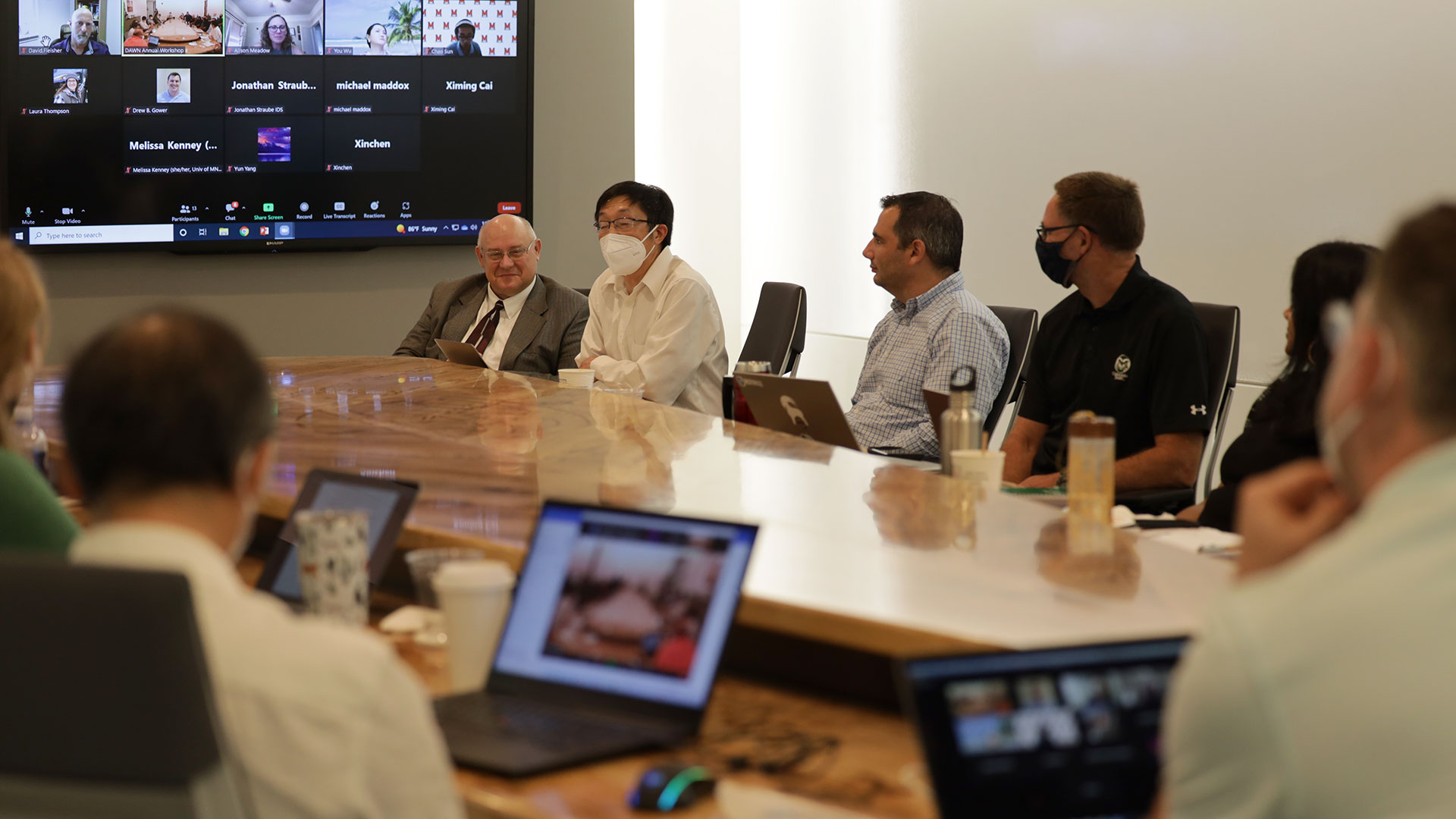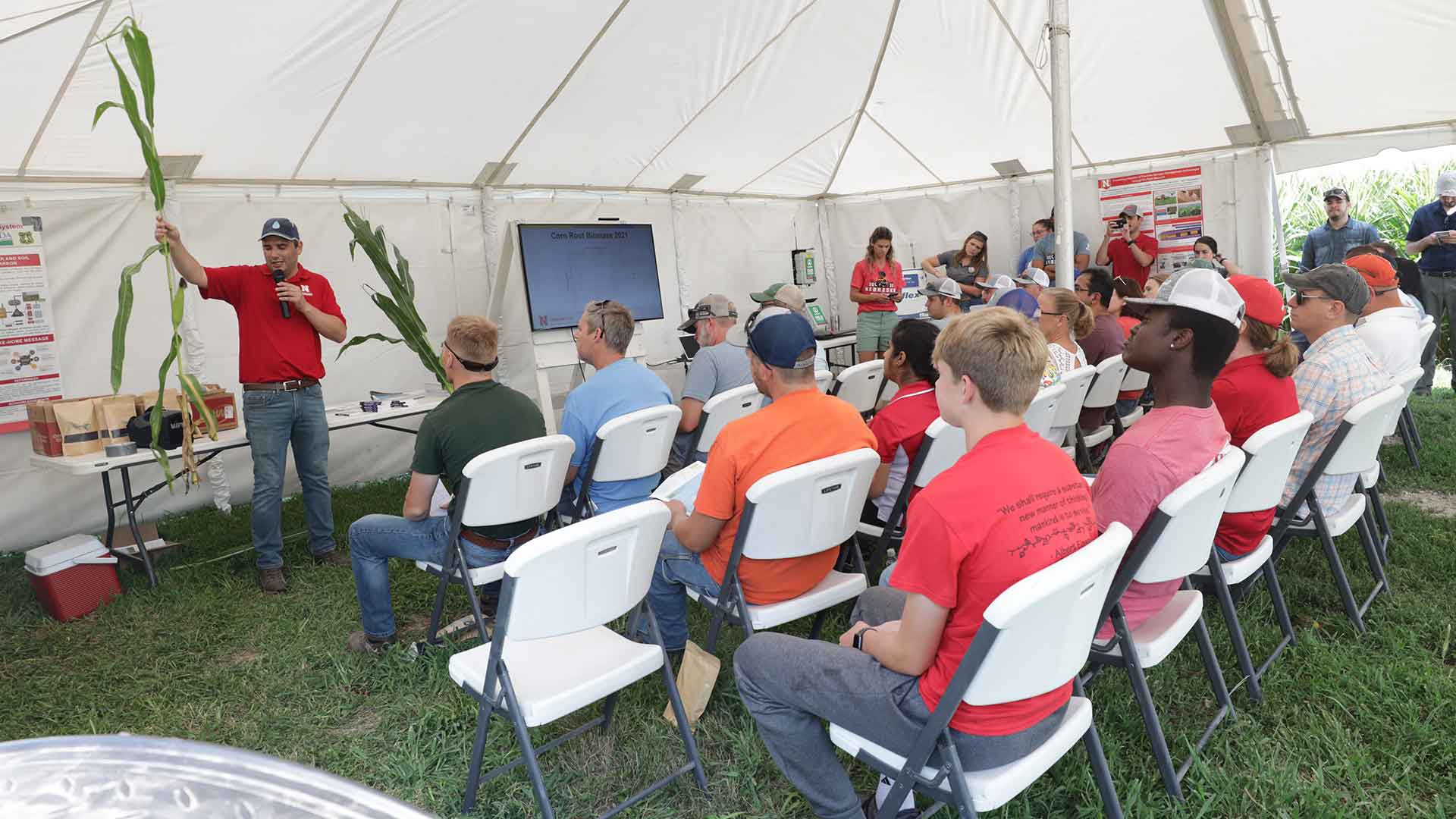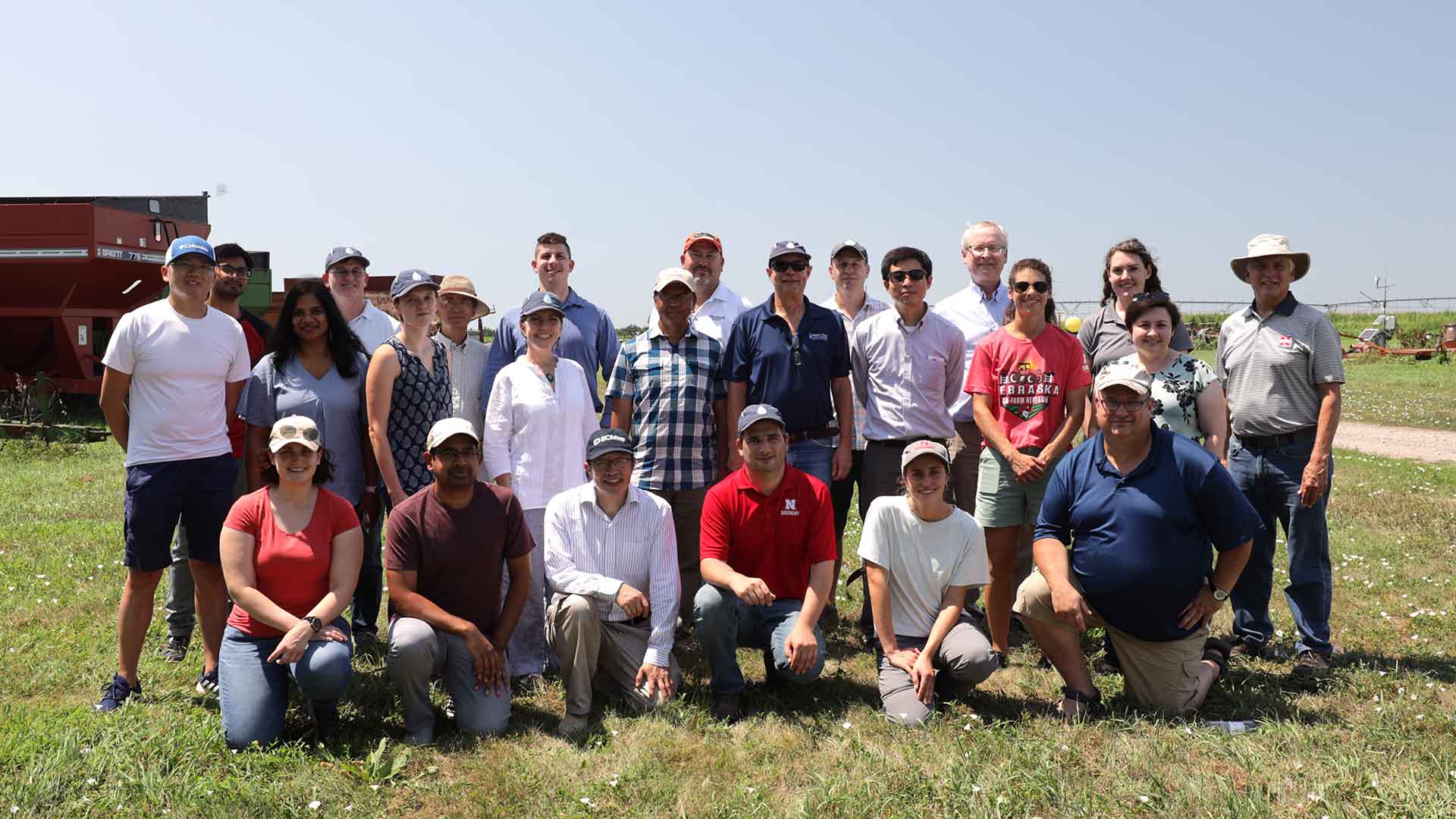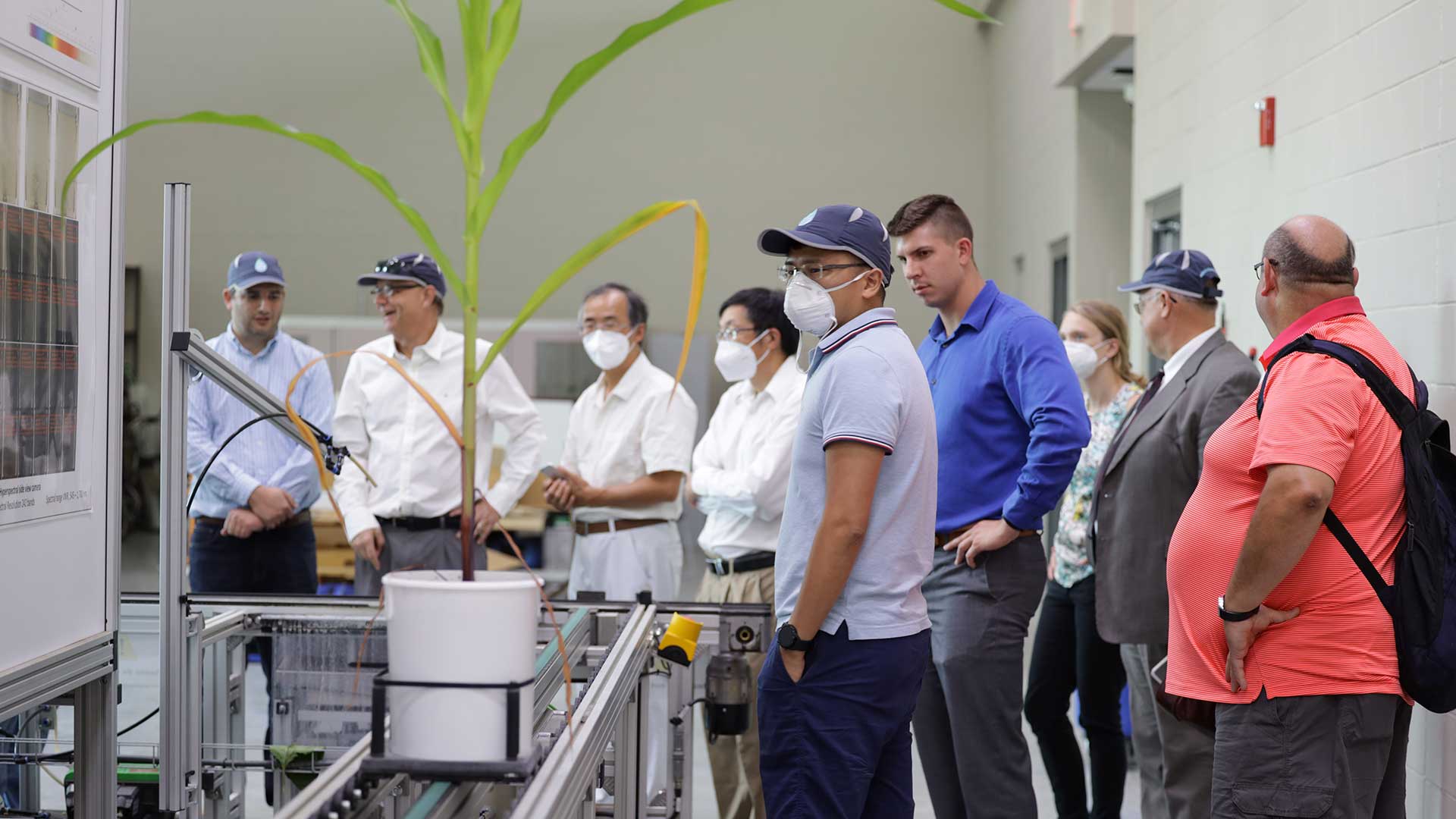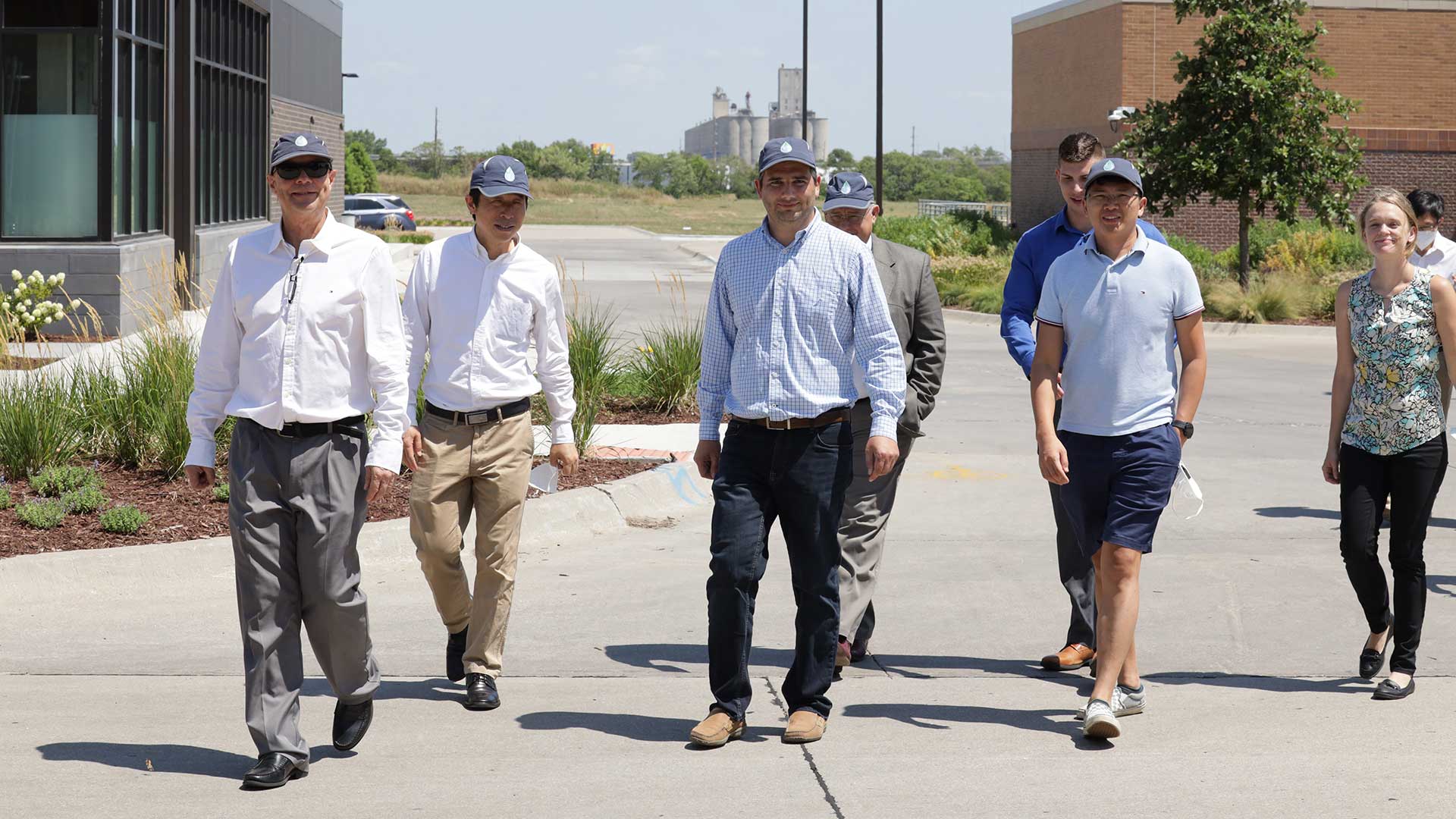DAWN Project testing its decision-support tools with corn and soybean growers
The Dashboard for Agricultural Water Use and Nutrient Management (DAWN) project aims to support farmers in translating seasonal climate predictions into practical and accessible field-level recommendations for water and nutrient management.
The dashboard will give farmers and water managers access to customized forecasts and decision support tools that simulate critical agricultural variables. This information will help them make decisions related to crop selection, planting date, and irrigation and nutrient management for the entire season.
About the DAWN Project
The five-year, $10 million U.S. Department of Agriculture-funded project is a collaborative effort between DWFI, the University of Nebraska–Lincoln (UNL) and several other universities and organizations and is led by the University of Maryland. The project kicked off in 2020 and is in phase one of the project — working closely with "early adopter" producers, including those in Nebraska, to test the decision-support tools that include tracking growing degree days and predicting corn growth over the course of the season. One-on-one interviews are then conducted to gain feedback to integrate into the project. The University of Nebraska is receiving an $890,000 portion of the $10 million to complete its contributions to the project, which include work on irrigation modeling, the decision support system and extension efforts.
DWFI and UNL’s contribution to the project
For one of its irrigation scheduling approaches, DAWN makes use of the SETMI product developed by DWFI. SETMI uses remotely sensed imagery inputs from satellite, drone and aircraft platforms to estimate evapotranspiration – water moving from the soil to the atmosphere through evaporation or plant transpiration – and predict irrigation needs.
Christopher Neale, DWFI director of research, is a co-principal investigator for DAWN and leads the UNL effort on estimating evapotranspiration using satellite remote sensing and the SETMI model, as well as working with DAWN’s extension and decision support system teams. His colleague, Ivo Zution Gonçalves, DWFI research assistant professor, and Ashish Masih, DWFI research engineer, are working on an open-source version of the SETMI model to use in the dashboard. Melina Petenatti, a DAWN intern and agronomy student from the University of Río Cuarto in Argentina, is helping test the model over the 2023 growing season.
In August 2022, DWFI hosted 25 members of the DAWN team at Nebraska Innovation Campus for its annual meeting and workshop to end the project’s second year. The team largely focused on reporting accomplishments and identifying realistic priority tasks for the next year.
The team also visited UNL’s South Central Agricultural Laboratory, where they participated in the lab’s 2022 Field Day, an outdoor event for local farmers to connect with researchers and each other. DAWN tool developers talked with farmers about their needs and how DAWN’s dashboard could better address them.
Guillermo Raul Balboa, one of the UNL researchers on the DAWN project and a research assistant professor in UNL’s department of agronomy and horticulture, said that so far, growers have shown a lot of interest in the project and trust in its trust in its processes since it is a collaboration between multiple universities and funded by the USDA, which also means the tool will be free to users.
Existing decision support tools fail to capture the bigger picture for growers — including the complex interactions among agriculture, climate, land and water use, and economic and environmental impacts, Balboa said. DAWN differentiates from other tools in that it integrates current weather forecasts and other variables into the models, rather than predicting conditions based solely on the average of data from past years. The platform is also based on modeling infrastructure that provides seasonal-scale forecasts at finer resolutions and higher accuracies than have previously been available, capturing key climate and crop interactions across the U.S. Corn Belt. This is especially important with climate change presenting more abnormalities when it comes to weather, climate and growing conditions, said Balboa.
In addition to supporting the DAWN team with grower testing, Balboa and his team have conducted statewide surveys of farmers in Nebraska to learn more about their use of technology and how they can increase adoption of the DAWN tools. Balboa’s results showed that barriers of technology adoption among farmers include high cost of the tools, lack of training for use of the technology and being overwhelmed by the number of technologies available. They hope to combat these barriers with the DAWN project.
Laura Thompson, another DAWN collaborator and a UNL extension educator co-coordinates the Nebraska On-Farm Research Network, which allows farmers and agronomists to be active participants in research. Laila Puntel, assistant professor in UNL’s department of agronomy and horticulture, is also involved with the extension component of the DAWN project. The UNL team has employed three interns for the summer of 2023 to assist with the project, including Petenatti.
Outcomes and next steps for the project
In August 2023, the DAWN team will host its annual meeting in St. Louis, Mo. to set goals for the fourth year of the project and evaluate progress. After the project concludes, the team will have a free tool for growers to assist them in sub-seasonal and long-range decisions on when and how much water and fertilizer to apply.
By optimizing farm decisions for greatest efficiency, there will be more water available for future use and the chance of fertilizer leaching into groundwater is reduced. Additionally, farmers will see reduced input costs through water and fertilizer savings.
FY 2023 Annual Report
- Overview
- Introduction
-
Research and Policy
-
Global
- Brazilian agricultural state looks to Nebraska and DWFI to sustainably manage water resources
- Irrigation equipment ownership not always best for smallholder farmers
- McCornick and Neale re-elected to World Water Council, DWFI involved in preparations for the World Water Forum
- Understanding the agtech ecosystem in India can spur future investments
-
Regional + National
- DAWN Project testing its decision-support tools with corn and soybean growers
- Water Center director helps City of Lincoln find second water source
- Water, Climate and Health program makes an impact in Nebraska
- DWFI's flux tower network now helps validate carbon credits
- Understanding climate’s effect on the health of Americans
- Groundwater transfer success stories guide water managers in meeting local water needs
- Advancements in crop modeling help adapt to climate change
-
Global
-
Education
- Faculty Fellows
-
Supported Students
- DWFI funds eight new students working on mission-related projects
- DWFI continues support of Platte Basin Timelapse interns
- Estimation of manure nutrient capacity in Nebraska minimizes water quality impacts
- Could cover crops replace offset in-season corn fertilizer?
- Congratulations to DWFI-supported student graduates
-
Communication
- Digital and online engagement connects DWFI with its global audience
- Coverage of DWFI research and events reaches more than 219 million people
- Creative storytelling used to amplify DWFI smallholder irrigation research outputs
- DWFI expertise tapped for national reports and publications
- DWFI staff receive well-deserved recognition
- 2022 Nebraska Water Center Annual Report now available
-
Outreach and Events
- Global Conference draws international audience to address water and food security
- On-farm event in Western Nebraska strengthens partnerships, spurs new ideas
- Engagement recovers to pre-pandemic levels
- Drought at forefront of discussions at Platte River Basin Conference
- 49th Annual Water Tour broadens knowledge about Nebraska water
- Nebraska Water Center seminars focus on hot topics in Nebraska Water
- Development
- Resources
- Search
FY 2023 Annual Report
- Overview
- Introduction
-
Research and Policy
-
Global
- Brazilian agricultural state looks to Nebraska and DWFI to sustainably manage water resources
- Irrigation equipment ownership not always best for smallholder farmers
- McCornick and Neale re-elected to World Water Council, DWFI involved in preparations for the World Water Forum
- Understanding the agtech ecosystem in India can spur future investments
-
Regional + National
- DAWN Project testing its decision-support tools with corn and soybean growers
- Water Center director helps City of Lincoln find second water source
- Water, Climate and Health program makes an impact in Nebraska
- DWFI's flux tower network now helps validate carbon credits
- Understanding climate’s effect on the health of Americans
- Groundwater transfer success stories guide water managers in meeting local water needs
- Advancements in crop modeling help adapt to climate change
-
Global
-
Education
- Faculty Fellows
-
Supported Students
- DWFI funds eight new students working on mission-related projects
- DWFI continues support of Platte Basin Timelapse interns
- Estimation of manure nutrient capacity in Nebraska minimizes water quality impacts
- Could cover crops replace offset in-season corn fertilizer?
- Congratulations to DWFI-supported student graduates
-
Communication
- Digital and online engagement connects DWFI with its global audience
- Coverage of DWFI research and events reaches more than 219 million people
- Creative storytelling used to amplify DWFI smallholder irrigation research outputs
- DWFI expertise tapped for national reports and publications
- DWFI staff receive well-deserved recognition
- 2022 Nebraska Water Center Annual Report now available
-
Outreach and Events
- Global Conference draws international audience to address water and food security
- On-farm event in Western Nebraska strengthens partnerships, spurs new ideas
- Engagement recovers to pre-pandemic levels
- Drought at forefront of discussions at Platte River Basin Conference
- 49th Annual Water Tour broadens knowledge about Nebraska water
- Nebraska Water Center seminars focus on hot topics in Nebraska Water
- Development
- Resources
- Search
Top image caption
A farmer uses technology to manage his field through his tablet
Credit: Storyblocks | Sergey Gribanov
Related Articles
DWFI expertise tapped for national reports and publications
DWFI’s research and expertise is frequently requested for respected industry publications and reports. Here is a sample of the publications.
2022 Nebraska Water Center Annual Report now available
The Nebraska Water Center’s 2022 annual report is now available. This report highlights the research, outreach, and training done to support the Water Center’s mission in 2022.
Creative storytelling used to amplify DWFI smallholder irrigation research outputs
The DWFI communications team has capitalized on engagement growth in the digital space as a result of the pandemic.
COOKIE USAGE:
The University of Nebraska System uses cookies to give you the best online experience. By clicking "I Agree" and/or continuing to use this website without adjusting your browser settings, you accept the use of cookies.


